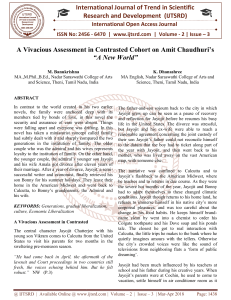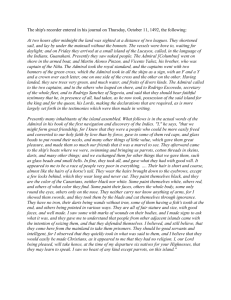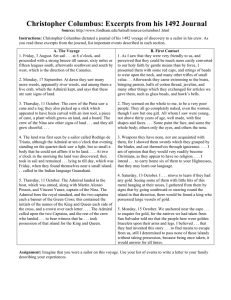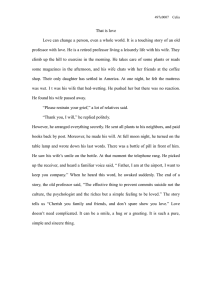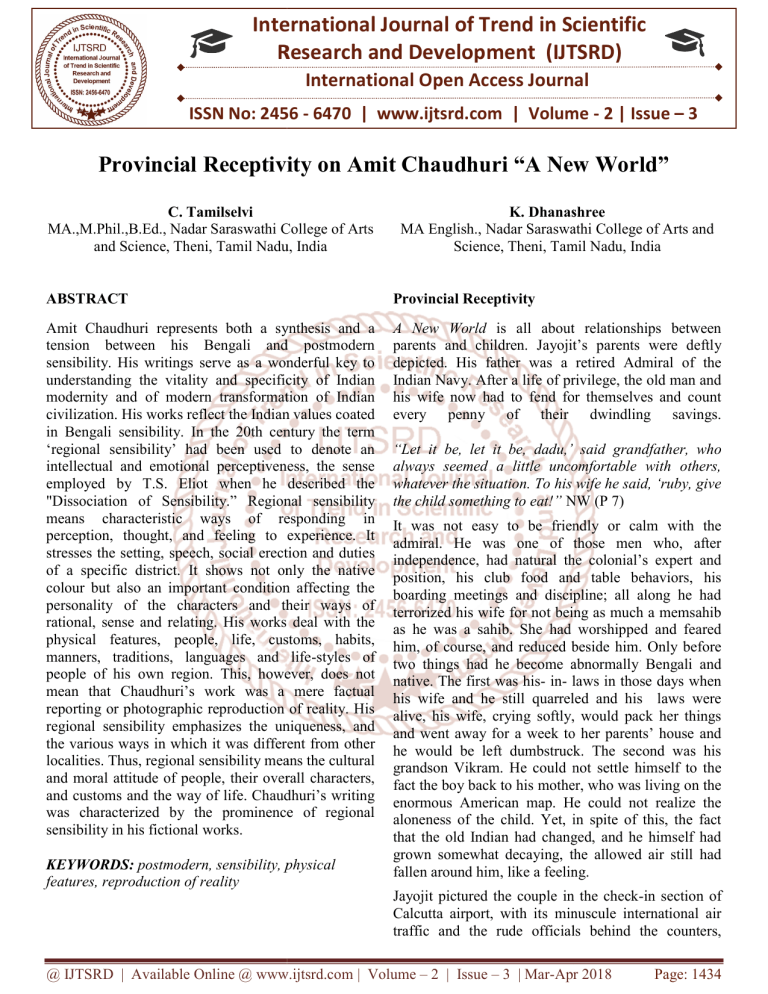
International Journal of Trend in Scientific Research and Development (IJTSRD) International Open Access Journal ISSN No: 2456 - 6470 | www.ijtsrd.com | Volume - 2 | Issue – 3 Provincial Receptivity on Amit Chaudhuri “A New World” C. Tamilselvi MA.,M.Phil.,B.Ed., Nadar Saraswathi College of Arts and Science, Theni, Tamil Nadu, India K. Dhanashree MA English., Nadar Saraswathi College of Arts and Science, Theni, Tamil Nadu, India ABSTRACT Provincial Receptivity Amit Chaudhuri represents both a synthesis and a tension between his Bengali and postmodern sensibility. His writings serve as a wonderful key to understanding the vitality and specificity of Indian modernity and of modern transformation of Indian civilization. His workss reflect the Indian values coated in Bengali sensibility. In the 20th century the term ‘regional sensibility’ had been used to denote an intellectual and emotional perceptiveness, the sense employed by T.S. Eliot when he described the "Dissociation of Sensibility.” sibility.” Regional sensibility means characteristic ways of responding in perception, thought, and feeling to experience. It stresses the setting, speech, social erection and duties of a specific district. It shows not only the native colour but also an important mportant condition affecting the personality of the characters and their ways of rational, sense and relating. His works deal with the physical features, people, life, customs, habits, manners, traditions, languages and life life-styles of people of his own region. ion. This, however, does not mean that Chaudhuri’s work was a mere factual reporting or photographic reproduction of reality. His regional sensibility emphasizes the uniqueness, and the various ways in which it was different from other localities. Thus, regional gional sensibility means the cultural and moral attitude of people, their overall characters, and customs and the way of life. Chaudhuri’s writing was characterized by the prominence of regional sensibility in his fictional works. A New World is all about relationships between parents and children. Jayojit’s parents were deftly depicted. His father was a retired Admiral of the Indian Navy. After a life of privilege, the old man and his wife now had to fend for themselves and count every penny of their dwindling savings. KEYWORDS: postmodern, sensibility, nsibility, physical features, reproduction of reality “Let it be, let it be, dadu,’ said grandfather, gra who always seemed a little uncomfortable with others, whatever the situation. To his wife he said, ‘ruby, give the child something to eat!” NW (P 7) It was not easy to be friendly or calm with the admiral. He was one of those men who, after independence, pendence, had natural the colonial’s expert and position, his club food and table behaviors, his boarding meetings and discipline; all along he had terrorized his wife for not being as much a memsahib as he was a sahib. She had worshipped and feared him, off course, and reduced beside him. Only before two things had he become abnormally Bengali and native. The first was his- in- laws in those days when his wife and he still quarreled and his laws were alive, his wife, crying softly, would pack her things and d went away for a week to her parents’ house and he would be left dumbstruck. The second was his grandson Vikram. He could not settle himself to the fact the boy back to his mother, who was living on the enormous American map. He could not realize the aloneness eness of the child. Yet, in spite of this, the fact that the old Indian had changed, and he himself had grown somewhat decaying, the allowed air still had fallen around him, like a feeling. Jayojit pictured the couple in the check-in check section of Calcutta airport, irport, with its minuscule international air traffic and the rude officials behind the counters, @ IJTSRD | Available Online @ www.ijtsrd.com | Volume – 2 | Issue – 3 | Mar-Apr Apr 2018 Page: 1434 International Journal of Trend in Scientific Research and Development (IJTSRD) ISSN: 2456-6470 Ranjit mesho and dolly mashi, confused but not unhappy, with their suitcases, he was looking like an executive whose career had begun well but not taken off, but he still believed in the system, happy to be going abroad, no matter that it was by Bangladesh Biman, and dolly mashi, always in a printed sari, savings her good saris for who knows which day, accompanied by the same two suitcases they must always use when travelling. His mother was not the best possible cook, and these days she had a helper who did some of the cooking in the morning; this helper was not a very good cook either. But Jayojit was not too fussy about food and nor was the admiral; for the latter, especially home food was just a routine, and had to be healthy and cooked in a small amount of oil; excesses in connection with food were to be indulged in the club Christmas or new year eve parties, where strangely shaped gateaux were served and people line up up for their portion of roasted steak and sautéed vegetables. His father bent and serious, then dabbing his white beard with a duster, was eating silently. He was old fashioned; he rarely praised his wife’s cooking, but kept his ears pricked, like a child’s for other’s praises. More and more his wife had become to him like a mother and a nurse giving him his medicine with a glass of water, serving his food, to which he submitted with a helpless, sour- faced, childlike decorum, and overlooking, with good humor his constant need to exercise his inconsequential tyrannical hold over this household in which usually only he and his wife lived, with part- time servants coming and going each day. He ate with a fork and a spoon as he always did laboriously as if haunted by the expectation or memory of some pain – perhaps the mild them, stroke he had seven years ago, which any day might recur. Above them, the fan with its three blades turned swiftly, generously but invisibly, distributing air. Bonny sat next to his grandfather, perky after the bath; he had nothing but daal and rice and a piece of the fried ruin. “the daal’s good’, he said, holding up his spoon. ‘have the other fish, Shona,’ said grandmother.’ Try the vegetables.’ NW (P 15). The boy stopped eating the food still in his mouth and looked around guiltily, but also pleased at this exchange about him, and at this description of himself as someone difficult and intractable; he was interested in his father’s portrait of himself. now the admiral, having deftly divested the fish of its flesh with his fork and spoon , leaving only the bones, picked up the head with his spoon, intending to chew it; the sound of his breathing surrounded him. The admiral had a car, an old fiat, but did not use it often. And he did not have a driver. Costs were too high these days; the cost of petrol, drivers, salaries, things in general. The last deriver was a man called alam, a tried- looking man who had slept his way through most of his employment. The admiral always aggressively told his wife to save, though she still found it difficult to adjust to the different rhythms of expenditure required after retirement. For a while he had been engaged as a consultant in a Marwari company, and then given it up; he had grown fed up going to the office daily for what he thought a paltry salary, and having to put up with what he discovered after the navy was a rather peculiar style of functioning. The next year he had got rid of the driver and never employed one since; anyway, and then all spoilt the car with their tinkering. When he had been admiral, stationed first in Cochin and then in Delhi, it had been a dream- world; everything had been done for them; they had a huge bungalow wherever they went, a car, colored the navy’s deep blue with two stars painted on the back- identifying his rank- and they had never though the value of money would depreciate so rapidly after retirement they had never thought of the value of money before. The institution, even the country, he had served did nothing for him, they gave him everything as long as he were working, but in old age he had to manage their life and their finances themselves. A major drain on their savings had been the admiral’s stroke; doctors, medicines, the hospitals- the expensive business of keeping oneself alive. Of course, the government had contributed to hospitalization costs, but they could not be genuinely concerned- the admiral’s health was only an abstraction to them. His principal preoccupations now concerned his savings and that Jayojit should start afresh, or, after what happened, at least lead the second half of his life decently. He thought about these matters every day. “Then some time ago, bonny said you had woken up and gone to take a bath, and I began to fry the luchis, Well gaur is not maple syrup, said Jayojit to his son. He added explanatorily and with an inflection of pride, he loves maple syrup” NW (P.23) Earlier in the morning, a temporary help had come and cooked a dry vegetable preparation. This was waiting outside on the dining table in a covered porcelain bowl, silvers of pumpkin and potatoes fried @ IJTSRD | Available Online @ www.ijtsrd.com | Volume – 2 | Issue – 3 | Mar-Apr 2018 Page: 1435 International Journal of Trend in Scientific Research and Development (IJTSRD) ISSN: 2456-6470 with onions and black jeera. It had become pleasantly cool with the passing of time, and went with the hot luchis, and contrasted temperately with the general heat. Jayojit sat on a chair and broken the luchis ate, a giant in his shorts, one large leg crossed over another. Ever since he had become single again he had begun to eat what he could in America, indiscriminately plundering the shelves in the supermarket for frozen food and pizzas. He had first read about TV dinners in mad magazine when he was growing up. These days in America, he looked at food, as he did many other things, emotionlessly, as something that could be put to use and cooked quickly. Some could not know of his secret life in that continent, of driving down the motorway, going to the supermarket, filling up a trolley with things, his orphan hood and distance from his country and parents, and that of other people like him, wandering around the aisles of the supermarket in shorts, with wives, or perhaps alone, with the ex-wife somewhere completely else, running into each other. His mother could not even imagine it. There was a south Indian couple, the Nair’s; he had run into three times at the supermarket he shopped at. They had an arranged marriage. He was dark; pleasantly blunt- nosed, bespectacled, and had a moustache; she was curlyhaired, large- eyed, and dark. Nair had degree biochemistry, and worked as a marketing man in a pharmaceutical company. They had met only once socially; but in the vegetable section of the supermarket, they had discovered each other with surprised exclamations again and again. He had learnt that, unsurprisingly, they were vegetarians. The first time they had met at the lunch party, Jayojit had been with his wife Amala; but at the supermarket, he was already alone, and they, after the first occasion, had not asked about her: word got around so quickly among the network of Indians they would have known. Jayojit enjoyed Nair’s south Indian accent, its slow intimacy, and his wife wore slacks and a loose tshirt and a large Bindi on her forehead. He had realized in his post- retirement years in Calcutta that his commanding presence was of no use at post offices and banks; in facts, the clerks seemed to sense he took his privileges for granted and resented it. He had to learn to tone down his voice, to wait patiently like everyone else in silence. Jayojit nodded. Although he was an economist theory than shrewd investment, about global trends and third world markets, but as to how they intersected with something particular and real, like his father’s personal life and decisions- that was different, and beyond the scope of his discipline. In principle, Jayojit was all for this new flood of investors and companies into the country. During the time of the Rajiv Gandhi government, when the prime minister had been gathering advisors around himself, mainly from among his Cambridge friends, someone had recommended Jayojit, who was then teaching at buffalo. Jayojit had sent him a plan, suggesting gradual liberalization; thus, he had been there, in a sense, at the beginning. In the new, as yet unfinished, brickwork of Indian’s new economic order, Jayojit had laid an early and important cornerstone. Nothing but economic reform, he believed, could change India from a country living on borrowings from the west into a productive and competitive one. Yet now, when he saw his father’s hesitation about investing in shares, for which he had neither the means nor the confidence, he had no advice to give him. Jayojit wanted to spend as much time as possible with him. Although it was clear that he and his wife had not got on from the very beginning, some urge to rehearse what their parents had gone before them had taken hold of him, of her, and without fully understanding what they were doing, they had brought a child into the world, in a small nursing home in a Midwestern American town. Bonny had been born three years after the marriage. The first two years were the years of amorous energy. Yet it had been absurd. Both Amala and Jayojit had grown up with the same background, listened to the same music, liked the Beatles; she predictably shied away from the rolling stones as so many girls he used to know in school had. He had clung to the loyalties he thought he was shaped by, she had seamlessly allowed herself to shed her early enthusiasms, which probably had not been very intense in the first place, and listening to the incomprehensible music of the eighties, at first, he found this touching. Both of them had decided, at some point in their lives, without articulating it to themselves, like a pact they had made with several others without knowing it, that an arranges marriage was the best option. Bonny now went to a school in San Diego, near where his mother lived. He was at that stage when only the simplest arithmetic – addition, subtraction, multiplication- was taught, when five – sentence composition were assigned to be written. Jayojit had to meet the head teacher to request from the school an extra month off for Bonny’s holidays. When Jayojit could not sleep the first few nights, he @ IJTSRD | Available Online @ www.ijtsrd.com | Volume – 2 | Issue – 3 | Mar-Apr 2018 Page: 1436 International Journal of Trend in Scientific Research and Development (IJTSRD) ISSN: 2456-6470 had reread the morning’s statesman; the headlines become strange at the end of the day, when the appositeness that news had in the morning- calamities and predictions- had already passed into its daily afterlife. There was one he had been fooled by, an advertisement pretending to be a report, with the headline miraculous antidote to hair loss announced, which he began to read with the same unquestioning acceptance with which he read the rest of the newspaper, before he came to its end and realized. After this, he folded the paper, switched off the lamp, and tried to sleep. Walking at home in his house in Claremont, used to be difficult, with bonny gone, withheld from him like a promise and Amala, his wife, gone. Some of the pictures she had bought prints; pichwais with serene trains of elephants, the cowherd god, dallying with the gopis, identified by the peacock- plume above the forehead – were still on the walls. Mornings were quiet in Claremont; it was as if they waited till radio alarm clocks begun to play and people got up. He lay still before he rose in his house in Claremont, feeling quite separate from the man who had written a book about economic development, who drove a ford, who had secured tenure. The only other picture of a couple among those photographs was one of Jayojit’s parents. It had been taken on their twenty- fifth marriage anniversary. The admiral was noticeably less heavy in the photography than now, his hair and beard a little less long. She was smiling faintly, almost shyly. Then there was a picture of the admiral in uniform, taken some time in the eighties, a few years before Jayojit god married. There were also, separately, pictures of the admiral’s parents; one of his mother and another of his father. Faded and obscure, and to all purposes forgotten, they still did not seem insignificant; they lived in some afterlife, but some moment in history as difficult to imagine now as this moment would have been to imagine then. In its own and different way, that time must have been as shadowy and uncertain as any now, struggling, as well, to arrive at its brief being and truth; everything about that world must have been disequilibrium and dark to Jayojit’s grandfather. Jayojit knew that his grandfather had once run away from home to seek spiritual truth, and later, for some reason, returned to his parents. Then, not content to inherit land and his father’s estates, he had gone to Dhaka and then to Calcutta and become a successful journalist. Thus Jayojit father had been born in Calcutta, somewhere in the north, where it was impossible to drive because of the traffic. Jayojit himself had never seen his father’s mother; his father’s father had died when he was there. “And there was no black money involved because it was a government scheme; but it was a stroke of good luck that the admiral had been successful in his application without bribes or pulling strings. But, in those years, he had not seen it as good luck, he had almost expected, in a naïve, trusting way, nothing else” NW (P.61) His mother’s parents he could remember well. For years they used to live in a small mining town in Bihar. Sometimes he had gone to them with both his parents, sometimes with his mother. He had notice, then how fragile and unthinking his mother’s relationship seemed to be with his grandparents, how forgetful she became when she was with them, and then longed to go back after a month had passed, as if she had grown tired because she had never completed be a girl again. Whenever the admiral was in Calcutta in that period, He would came to his lane to take a look at the building as it came up, first the skeleton of the construction, then the gaps where the rooms were. He found the process oddly interesting and involving; it was not always one had the opportunity to watch a vision, however ordinary, take shape. Conclusion: The lane, with the post office nearby, and the stately old mansions that were still there now, was subtly different; it was as if the lane were, in its way, passing from one phase of its history to another, in a way that was somehow connected to the completion of the building and his being there, a reticent but attentive witness. In the process, we saw his interaction with his parents, his parent's relationship and his own relationship with his parents. There were also flashback to his broken marriage and his parents’ abortive attempt to arrange a second marriage for him with a Bengali divorcee. He had met her on his previous visit but they had got nowhere. She had backed out; he now leaves from his father, because he had seemed to be looking not so much for a wife as a governess for his son. Reference: Chaudhuri, Amit. “A New World” London Picador, 2000. @ IJTSRD | Available Online @ www.ijtsrd.com | Volume – 2 | Issue – 3 | Mar-Apr 2018 Page: 1437
